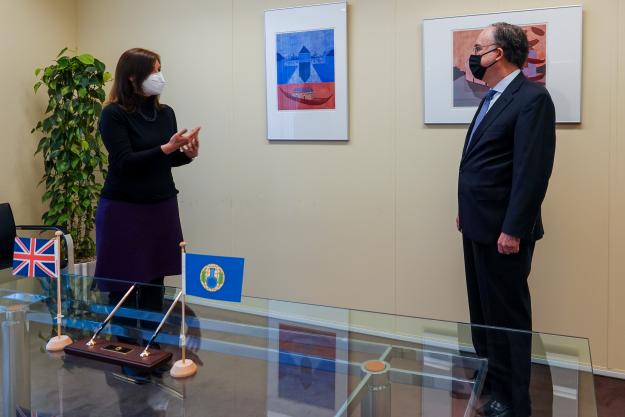The Government of the United Kingdom of Great Britain and Northern Ireland has made a voluntary contribution of £29,000 to support training activities at the Organisation for the Prohibition of Chemical Weapons (OPCW).
The contribution was formalised during a ceremony between the Permanent Representative of the United Kingdom to the OPCW, H.E. Ambassador Joanna Roper CMG, and OPCW Director-General, H.E. Mr Fernando Arias, which was held at OPCW Headquarters in The Hague.
The funds will support training for inspectors and other relevant OPCW personnel in skills necessary for non-routine inspections, investigations and Rapid Response and Assistance Mission (RRAM) deployments, as well as for regional Assistance and Protection training in the Caribbean.
Ambassador Roper remarked: "I am delighted to make a further contribution towards supporting OPCW inspector training and capacity building activities in the Caribbean. This voluntary contribution will enable tangible improvements to the capabilities of States Parties and help achieve a world free of chemical weapons."
The Director-General stated: "I thank the Government of the United Kingdom for its continuous support to the OPCW. Developing personnel expertise is critical to maintaining the Organisation's readiness and capability to lend a helping hand to its Member States during emergency and non-routine situations. Additionally, building regional assistance and protection capacity ensures greater ability of Member States to confidently handle chemical crises."

Permanent Representative of the United Kingdom to the OPCW, H.E. Ambassador Joanna Roper CMG, and OPCW Director-General, H.E. Mr Fernando Arias
Background
The Rapid Response and Assistance Mission (RRAM) was established in May 2016. The RRAM is deployed upon request of a State Party to the Chemical Weapons Convention that is in need of emergency assistance due to a chemical attack. Composed of a group of experts from the OPCW Technical Secretariat, the RRAM possesses capabilities to provide advice on a range of different scenarios that may occur during a chemical attack. The RRAM can also support a State Party in coordinating efforts with other International Organisations.
OPCW's specialised Assistance and Protection Branch provides Member States with expert advice and programmes to develop and improve their emergency response capacity against the use or threat of use of chemical weapons. The Branch is also responsible for the maintenance of a state of readiness within the Organisation to respond rapidly and effectively to a request of assistance made by a Member State pursuant to Article X of the Chemical Weapons Convention and to coordinate and deliver assistance to the requesting Member State.
As the implementing body for the Chemical Weapons Convention, the OPCW, with its 193 Member States, oversees the global endeavour to permanently eliminate chemical weapons. Since the Convention's entry into force in 1997, it is the most successful disarmament treaty eliminating an entire class of weapons of mass destruction.
Over 98% of all declared chemical weapon stockpiles have been destroyed under OPCW verification. For its extensive efforts in eliminating chemical weapons, the OPCW received the 2013 Nobel Peace Prize.






